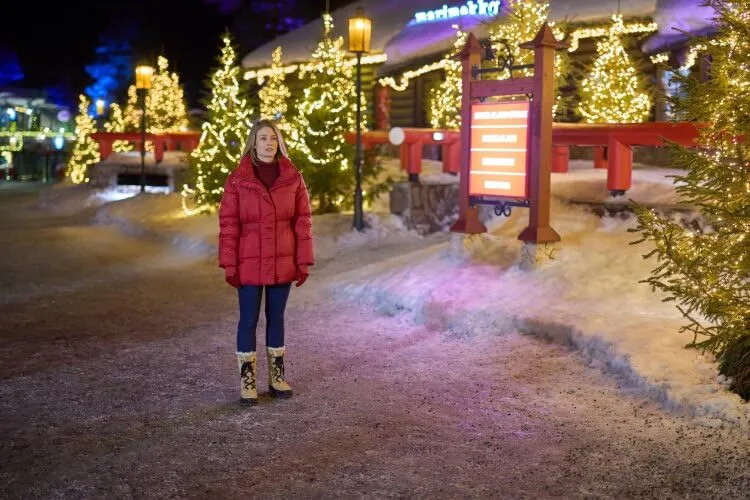Rovaniemi, Finland, sometimes known as the “official hometown of Santa Claus,” presents an exquisite setting for The Finnish Line. This film combines the chilly thrill of dog sled racing with the warmth of winter tradition.
The film occurs during the Joulurauha race, a three-day, 300-mile sled dog competition that winds through Finland’s snow-covered wilderness. This isn’t just an ordinary race; it’s steeped in mythology, with some claiming it follows the same route Santa used to practice for his global Christmas Eve journey.
At the heart of the story is Anya Kivela (Kim Matula), an Arizona-based dog sled racer who goes to her late father’s birthplace to honor his legacy by racing in the same race that ended his career. However, this is not just a sports film.
It’s a story of grief, self-discovery, and connection as Anya navigates a world of fierce competition, familial expectations, and an unexpected romance with Cole (Beau Mirchoff), a former racecar driver turned journalist.
Character Driven
The Finnish Line is a character study disguised as a sports-romance narrative. Anya Kivela’s emotional journey serves as the film’s beating heart. Anya’s story begins with a modest but felt weight: grief. Her late father’s legacy as a renowned sled dog racer is both a source of pride and a burden, a reminder of a life she wishes to honor but is unsure how to completely embrace.
The film positions the Joulurauha race as a space for Anya to address her unresolved feelings rather than just a competition by using it as a literal and metaphorical framework for her journey. It’s not about the race as much as what it represents: healing, connection, and rediscovery. This is where The Finnish Line feels more personal than your typical holiday movie.
The supporting characters’ relationships with Anya are essential to this narrative. Her relationship with Elyse (played with effervescent charm by Nichole Sakura) is a standout, a refreshing portrayal of female friendship that feels genuine and lived-in. Elyse is more than just a sounding board for Anya’s troubles; she’s a lively character who adds humor and warmth to the story. Their friendship anchors Anya and reminds her that she is not alone on her journey.
Then there’s Cole, a journalist with a history of dog sledding. What should have been a conventional opposites-attract romance is elevated by sophisticated writing and Kim Matula and Beau Mirchoff’s effortless chemistry. Cole tests Anya’s guarded personality while maintaining her independence, and their romance evolves at a deliberate pace that feels deserved.
Anya’s progress is subtle but impactful. Early on, she is defined by her father’s shadow: determined, yes, but closed-off and suspicious. By the end, she’s learned to appreciate vulnerability, not just in her relationships but also in how she perceives herself. It’s a rewarding storyline that feels both truly human and refreshingly modest.
Love in the Frost
For what may initially appear to be a typical holiday rom-com plot, the romance between Anya and Cole in The Finnish Line develops surprisingly. The film avoids hurrying their connection, instead allowing it to develop naturally via moments of shared vulnerability and hesitant trust. Anya, who is still wary of journalists because of how they treated her late father, initially distances herself from Cole. Cole’s gentle perseverance and genuine interest—both in her story and herself—start softening her walls.
Their romance stands out for its intelligent, often funny banter that avoids the sugary mistakes common to the genre. Their banter feels lively, founded on mutual respect and curiosity rather than manufactured confrontation.
Beau Mirchoff’s Cole adds a consistent charm to the pairing, balancing Anya’s passion with his easygoing manner. At the same time, Kim Matula’s acting makes Anya’s guardedness feel truly human rather than clichéd. Their chemistry is palpable, especially when the script allows for moments of silence—a knowing glance, a shared laugh—that scream louder than words.
In many ways, the growth of their romance resembles the slow-burn charm of films like Before Sunrise or the opposites-attract dynamic in When Harry Met Sally. The Finnish Line may not reinvent the wheel. Still, it does reinterpret the standard rom-com formula with a refreshing genuineness, proving that romance does not have to feel rushed or overly contrived to be compelling. Love feels earned in this situation; it doesn’t just grow in the cold.
Supporting Cast Spotlight
In a film about personal development and competition, The Finnish Line’s supporting cast is critical to enriching the narrative and balancing Anya’s emotional journey. Nichole Sakura’s portrayal of Elyse, Anya’s best friend and teammate, is particularly effective.
Though her humor is a highlight, Elyse is more than just comic relief. She’s a steadying presence, providing steadfast support and a sharp wit that keeps the film’s tone lively while not undermining its genuineness. Elyse’s friendship with Anya is one of the film’s most interesting dynamics, as it is a rare example of a female friendship depicted with depth and realism in a genre dominated by love relationships.
On the opposite end of the spectrum is Monty White, the film’s antagonist and reigning sled dog champion. Páll Sigþór Pálsson delivers a marvelously textured performance, beginning with ludicrous bravado and gradually revealing surprising depth. Monty’s journey isn’t about salvation; it’s about understanding his limitations, a nuance that lifts him above the average mustache-twirling monster.
Other supporting characters, such as Anya’s Finnish cousin, Lavi (Benedikt Gröndal), bring warmth and humor to the group. Lavi’s growing romance with Elyse adds another dimension of charm, and his local knowledge helps us immerse ourselves in the Finnish atmosphere. The supporting ensemble works together to create a lively, interwoven world that feels lived-in and alive, enriching the film’s study of family, friendship, and competition.
Thematic Resonance
The Finnish Line is a story about legacy and the complicated interplay of grief, forgiveness, and self-discovery at its heart. Anya’s journey to Finland is less about winning a race and more about dealing with the weight of her father’s memory.
The film effectively investigates how grief forms identity—not as a static presence but as something that changes with time. Anya’s early ambition to win feels motivated by a desire for closure. Still, as the story progresses, it becomes evident that her journey is about understanding her place within her family’s history rather than proving herself to the world.
Forgiveness, particularly self-forgiveness, is prevalent throughout the story. Anya’s father’s death in the Joulurauha race weighs heavily on her. Yet, the film progressively reframes this apparent failure through minor but meaningful moments. By the end, Anya discovers that her father’s life was defined by love for his family rather than race. This move from external validation to personal resolution is one of the film’s most important takeaways.
The notion of connection pervades every relationship, from Anya’s link with her best friend Elyse to her growing trust in Cole. These relationships are more than narrative devices; they mirror the film’s larger message: healing and growth rarely occur in solitude. The movie’s emphasis on teamwork—literally and emotionally—reminds us that self-discovery frequently necessitates the assistance of others.
Finally, The Finnish Line serves as a sincere reminder that our greatest successes often lead us closer to understanding ourselves than the ones we set out to achieve.
Behind the Lens
One of the most stunning aspects of The Finnish Line is its cinematography, which captures Finland’s natural grandeur in sweeping, snow-drenched views that feel almost otherworldly. The film’s setting is more than just a backdrop; it is integrated into the story’s emotional heart.
The frigid forests and broad expanses of the Joulurauha race represent Anya’s internal journey, with the harsh, merciless landscapes expressing her seclusion and resilience. The use of light is also noteworthy; the soft glow of Finnish winter daylight contrasts well with the warm, comforting interiors, resulting in a visual rhythm that parallels the film’s emotional highs and lows.
However, the film’s use of CGI is less effective. While the sledding sequences are lively and exciting, some moments, such as the depiction of the northern lights, feel unduly fake, yanking the spectator out of the otherwise immersive experience. It’s a tiny problem, but it exposes the limits of monetary restraints.
The film truly shines in its accurate depiction of Finnish culture. The filmmakers flawlessly incorporate traditional holiday dishes and local customs into the narrative, bringing depth and dimension to the world. Even tiny moments, such as the protagonists’ peaceful contentment in shared silences, have a particular Finnish feel and provide the film with a feeling of cultural distinctiveness. This dedication to authenticity feels like a breath of fresh, icy air for a genre that frequently reduces its settings to generic festive happiness.
Overall Assessment
The Finnish Line stands out in the holiday movie landscape for its careful storytelling, authentic cultural details, and a refreshing blend of humor and heart. Its biggest strength is its character-driven narrative, which adds weight to Anya’s emotional journey while keeping a light, engaging tone.
Kim Matula and Beau Mirchoff’s chemistry lifts the romance storyline, and Nichole Sakura’s performance as Elyse gives the film vitality and charm. The cinematography portrays Finland’s wintry beauty with stunning clarity. Still, some CGI moments, particularly the northern lights, fall flat and feel out of place in an otherwise wonderfully absorbing film.
Despite its occasional flaws, the movie’s warmth and sincerity make it a worthwhile watch, particularly for character-driven storytelling fans. It avoids the cookie-cutter formula of many holiday films, providing a more complex and meaningful experience.
With its blend of romance, humor, and cultural authenticity, the Finnish Line is an ideal choice for those who appreciate sincere stories with a dash of adventure. It’s not innovative cinema, but it’s the type of movie you’ll want to watch again on a snowy evening wrapped in a blanket and sipping hot cocoa.
The Review
The Finnish Line
The Finnish Line is a welcome addition to the holiday film genre, merging heartfelt character journeys, relevant cultural elements, and a dash of romance with the thrill of a sled dog race. While some CGI moments and narrative conveniences distract marginally, the film's emotional honesty, great performances, and breathtaking Finnish scenery more than makeup for it. It's a story about healing, connection, and self-discovery that feels fresh and familiar. It's ideal for those looking for a Christmas movie with depth and charm that is as much about the journey as the destination.
PROS
- Beautiful Finnish setting with authentic cultural elements
- Strong lead performances, especially Kim Matula and Nichole Sakura
- Genuine, heartfelt character development
- Refreshing focus on friendship and family alongside romance
- Well-paced and engaging narrative with emotional depth
CONS
- Some CGI moments (e.g., northern lights) feel out of place
- Certain plot conveniences, like forced nighttime conversations during the race, feel contrived
- The sled dog racing aspect occasionally takes a backseat to character relationships





















































